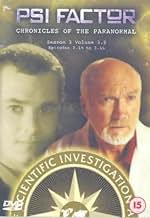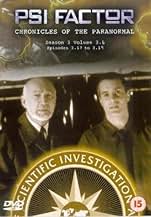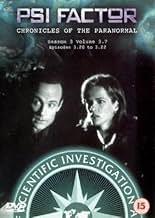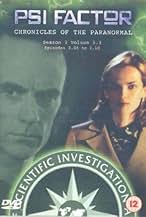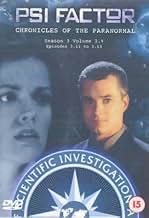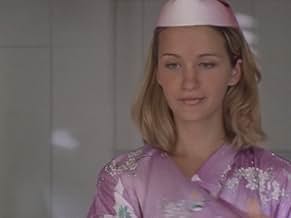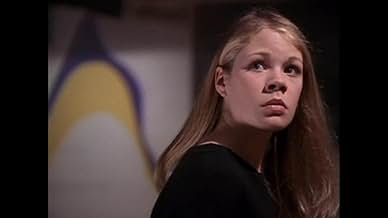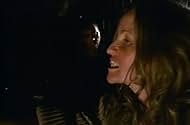VALUTAZIONE IMDb
7,1/10
2046
LA TUA VALUTAZIONE
Un team scientifico che lavora per l'Office of Scientific Investigation and Research (O.S.I.R.) indaga sulle segnalazioni di fenomeni soprannaturali.Un team scientifico che lavora per l'Office of Scientific Investigation and Research (O.S.I.R.) indaga sulle segnalazioni di fenomeni soprannaturali.Un team scientifico che lavora per l'Office of Scientific Investigation and Research (O.S.I.R.) indaga sulle segnalazioni di fenomeni soprannaturali.
- Premi
- 1 vittoria e 5 candidature totali
Sfoglia gli episodi
Recensioni in evidenza
I was really amazed at how long this show lasted. Sure, it was only four seasons, but as a show that was constantly (unfairly) dismissed as a lame X-FILES wannabe, the fact it lasted as long as it did is pretty surprising. The first season remains my favorite, with the show's original pseudo-documentary approach to stories inspired by real-life cases investigated by the Office of Scientific Investigation and Research. With it's blue-tinted witness interview footage, documentary-like feel, and two story-per-episode structure, PSI FACTOR offered up some intriguing stories for those interested in the world of the paranormal and supernatural. Paul Miller and Maurice Dean Wint alternated as lead investigators Professors Connor Doyle and Curtis Rollins, respectively, though Doyle proved to be the most popular character of the show, despite his forced departure at the end of the first season. Rollins took a leave of absence midway through the season, but would return for the forth (and final) season. The lovely Nancy Anne Sakovich, Colin Fox, and Barclay Hope rounded out the team of investigators as specialists in a specific field.
The second season saw the inclusion of genre veteran Matt Frewer as Matt Praeger, a more skeptical character who was brought in by the O.S.I.R. as Doyle's replacement, and though he was okay, he still couldn't fully replace Doyle. His character's skepticism brought a feeling of "here we go again" to the show, having to sit through yet another character who doesn't believe in much. That was what was so refreshing about Doyle; he always had an open mind about things and believed in anything until the evidence (if there was any) proved otherwise. Despite the lacking of some elements Frewer's Praeger had in comparison to Doyle, the second season still came out pretty good, with many standout episodes, though the show lost the documentary feel many fans loved from the first season and took on a more straight forward storytelling approach, as fell as focusing the entire hour on one story.
With the third season, the show took a turn for the worst as it made the same mistake X-FILES made: things began to focus more and more on internal conflicts within the O.S.I.R., headed up by Nigel Bennet as Elsigner. It was a shame to see the show make such a change when it had been doing just fine telling entertaining stories about paranormal/supernatural investigation. Instead, characters began having hidden agendas and there was internal conspiracies among the O.S.I.R. high-ranking officials. Following Frewer's (rather interesting) departure, the forth season attempted a return to the feeling of the first two years. Even the blue-tinted interview segments return for one episode, and an attempt to wrap up the mystery surrounding Connor Doyle's departure was featured in one of the season's few best episodes. But by the time the forth season was over, the show was gone, and it was such a shame, because it started out great and ended as a hollow shell of its former self. Much like how it appears X-FILES will end.
The second season saw the inclusion of genre veteran Matt Frewer as Matt Praeger, a more skeptical character who was brought in by the O.S.I.R. as Doyle's replacement, and though he was okay, he still couldn't fully replace Doyle. His character's skepticism brought a feeling of "here we go again" to the show, having to sit through yet another character who doesn't believe in much. That was what was so refreshing about Doyle; he always had an open mind about things and believed in anything until the evidence (if there was any) proved otherwise. Despite the lacking of some elements Frewer's Praeger had in comparison to Doyle, the second season still came out pretty good, with many standout episodes, though the show lost the documentary feel many fans loved from the first season and took on a more straight forward storytelling approach, as fell as focusing the entire hour on one story.
With the third season, the show took a turn for the worst as it made the same mistake X-FILES made: things began to focus more and more on internal conflicts within the O.S.I.R., headed up by Nigel Bennet as Elsigner. It was a shame to see the show make such a change when it had been doing just fine telling entertaining stories about paranormal/supernatural investigation. Instead, characters began having hidden agendas and there was internal conspiracies among the O.S.I.R. high-ranking officials. Following Frewer's (rather interesting) departure, the forth season attempted a return to the feeling of the first two years. Even the blue-tinted interview segments return for one episode, and an attempt to wrap up the mystery surrounding Connor Doyle's departure was featured in one of the season's few best episodes. But by the time the forth season was over, the show was gone, and it was such a shame, because it started out great and ended as a hollow shell of its former self. Much like how it appears X-FILES will end.
I like Psi Factor better than X-Files because it really happens. After you watch X-Files series, no matter how amazing or terrific it is, you'll end up saying: it's only movie. But, every time I watch Psi Factor... it opens up my mind that so many things, that I couldn't even imagine, exists. So, you think you already know and see everything... watch this series, you'll find out there is a lot more you don't know.
Psi Factor rode a rough road in its 4 years as a series. Conceived as a series based on the purportedly real organization of the OSIR, the stories were supposedly inspired by real life incidents investigated by the organization.
In its first year, the series used a docudrama format, with two 1/2 hour stories a week. They gave the major facts of a case, and the investigators were mostly there to present the story, and not to be active participants. In a lot of ways, while it was interesting, it was not necessary compelling. In two separate episodes, however, they used a single episode format, and the stories presented offered a great more promise than the rest of the episodes that season.
In order to keep the series alive, the producers changed the format for the second season, killing off a major character in the first season finale, and introduced two new character in the first episode of second season. The new characters were Matt Praeger (Matt Frewer) and Michael Kelly (Michael Moriarty)--one, a flippant criminologist with a background in mechanical engineering, and the other, a conspiracy theorist.
Matt Praeger took over the "A" team of the OSIR: the characters who survived the cast culling from first season: Peter Axon (Barclay Hope); Lindsay Donner (Nancy Ann Sakovich); Anton Hendricks (Colin Fox) and a myriad of secondary characters: Claire Davidson (Soo Garay); Lennox Q. Cooper (Peter Blais); Ray Donahue (Peter MacNeill) and Frank Elsinger (Nigel Bennett).
While the series survived through three additional seasons, more changes were instituted, including fourth season characters going missing, the introduction in fourth season of Mia Stone (Joanne Vannicola) and more intimate storylines [with less investigating team members].
The most disturbing change for many fans was the killing off on first season character, Connor Doyle. Many fans were extremely upset at the character's demise, making him very sorely missed for the rest of the show's run. Producers tried to make up for the loss several times, but logistics prevented them from bringing back Paul Miller until near the end of fourth season, where an episode entitled "Regeneration" brought him back to bring some closure to his character's demise.
Overall, the series had some promise, and while it didn't live up to its full potential, there were some promising episodes, and characters that were interesting and full of energy.
In its first year, the series used a docudrama format, with two 1/2 hour stories a week. They gave the major facts of a case, and the investigators were mostly there to present the story, and not to be active participants. In a lot of ways, while it was interesting, it was not necessary compelling. In two separate episodes, however, they used a single episode format, and the stories presented offered a great more promise than the rest of the episodes that season.
In order to keep the series alive, the producers changed the format for the second season, killing off a major character in the first season finale, and introduced two new character in the first episode of second season. The new characters were Matt Praeger (Matt Frewer) and Michael Kelly (Michael Moriarty)--one, a flippant criminologist with a background in mechanical engineering, and the other, a conspiracy theorist.
Matt Praeger took over the "A" team of the OSIR: the characters who survived the cast culling from first season: Peter Axon (Barclay Hope); Lindsay Donner (Nancy Ann Sakovich); Anton Hendricks (Colin Fox) and a myriad of secondary characters: Claire Davidson (Soo Garay); Lennox Q. Cooper (Peter Blais); Ray Donahue (Peter MacNeill) and Frank Elsinger (Nigel Bennett).
While the series survived through three additional seasons, more changes were instituted, including fourth season characters going missing, the introduction in fourth season of Mia Stone (Joanne Vannicola) and more intimate storylines [with less investigating team members].
The most disturbing change for many fans was the killing off on first season character, Connor Doyle. Many fans were extremely upset at the character's demise, making him very sorely missed for the rest of the show's run. Producers tried to make up for the loss several times, but logistics prevented them from bringing back Paul Miller until near the end of fourth season, where an episode entitled "Regeneration" brought him back to bring some closure to his character's demise.
Overall, the series had some promise, and while it didn't live up to its full potential, there were some promising episodes, and characters that were interesting and full of energy.
This is the best 'Sci-Fi' and 'paranormal' T.V series to have hit the screens. It deals with all paranormal activity and explores more themes than the regular X-Files. The special effects are great, so don't miss it.
Since our local station airs Psi-Factor immediately following The X-Files, my acquaintance with this unique Canadian show was inevitable. In the first season, the episodes were split into two separate segments of twenty or so minutes each, and the characters, investigative team members for the O.S.I.R. (Office of Scientific Investigation and Research), did little more than run around muttering techno-babble over their instrumentation. In other words, there wasn't much plot or character development.
By the second season, the format changed to a straight hour with one storyline, which improved things considerably; in my opinion, a show that deals with complex--not to mention, paranormal!--situations such as the ones showcased on Psi-Factor should be at least an hour long! The addition of Matt Frewer to the cast was also a big plus. His familiarity with the sci-fi genre made his settling-in time short and smooth while the character he plays, the off-beat, rebellious Case Manager Matt Praeger, injected some much needed fun and energy into what was a sometimes dour and uptight team. An X-Files-esque conspiracy began to develop as well, hinting at the possibility that perhaps those at the top of the O.S.I.R. echelon weren't simply running a legitimate scientific organization in earnest search of tangible proof of paranormal phenomena, but instead, with sinister governmental and corporate ties, shunt the flow of truth into confidential channels just when Matt and the rest of the team are getting close to something big. Which is where Michael Moriarty enters the picture: as the drunken, chain-smoking conspiracy fanatic with connections, Michael Kelly. He does an excellent job, and adds yet more depth to the show.
Not only do the relatively well-known Frewer and Moriarty shine, Colin Fox as the grandfatherly yet suave Professor Anton Hendricks, Barclay Hope as the protocol-obsessed and rather dishy physicist Peter Axon, Nancy Anne Sakovich as the modelesque, hacking genius, and Soo Garay as a somewhat necrophilic Dr. Claire Davison all give exceptional performances. Secondary characters such as mysterious good guy Case Manager Curtis Rollins (Maurice Dean Wint), dark man at the top Frank Elsinger (Nigel Bennett), and lovable goofball Lennox "L.Q." Cooper (Peter Blais) the team's cryptozoologist, always lend their own unique flavour to each episode they appear in.
With the third season came better effects, even more character development (as well as friction!), and higher quality scripts--which included some more in-depth explorations of the dubious string-pulling up top.
This show has really come a long way! Take a look at an early episode of the X-Files, you're bound to be shocked by the vast difference in quality compared to episodes from the most recent few seasons. I believe we're seeing a similar progression with the fantastic--in every way--Psi-Factor. Way to go Dan Ackroyd and crew!
By the second season, the format changed to a straight hour with one storyline, which improved things considerably; in my opinion, a show that deals with complex--not to mention, paranormal!--situations such as the ones showcased on Psi-Factor should be at least an hour long! The addition of Matt Frewer to the cast was also a big plus. His familiarity with the sci-fi genre made his settling-in time short and smooth while the character he plays, the off-beat, rebellious Case Manager Matt Praeger, injected some much needed fun and energy into what was a sometimes dour and uptight team. An X-Files-esque conspiracy began to develop as well, hinting at the possibility that perhaps those at the top of the O.S.I.R. echelon weren't simply running a legitimate scientific organization in earnest search of tangible proof of paranormal phenomena, but instead, with sinister governmental and corporate ties, shunt the flow of truth into confidential channels just when Matt and the rest of the team are getting close to something big. Which is where Michael Moriarty enters the picture: as the drunken, chain-smoking conspiracy fanatic with connections, Michael Kelly. He does an excellent job, and adds yet more depth to the show.
Not only do the relatively well-known Frewer and Moriarty shine, Colin Fox as the grandfatherly yet suave Professor Anton Hendricks, Barclay Hope as the protocol-obsessed and rather dishy physicist Peter Axon, Nancy Anne Sakovich as the modelesque, hacking genius, and Soo Garay as a somewhat necrophilic Dr. Claire Davison all give exceptional performances. Secondary characters such as mysterious good guy Case Manager Curtis Rollins (Maurice Dean Wint), dark man at the top Frank Elsinger (Nigel Bennett), and lovable goofball Lennox "L.Q." Cooper (Peter Blais) the team's cryptozoologist, always lend their own unique flavour to each episode they appear in.
With the third season came better effects, even more character development (as well as friction!), and higher quality scripts--which included some more in-depth explorations of the dubious string-pulling up top.
This show has really come a long way! Take a look at an early episode of the X-Files, you're bound to be shocked by the vast difference in quality compared to episodes from the most recent few seasons. I believe we're seeing a similar progression with the fantastic--in every way--Psi-Factor. Way to go Dan Ackroyd and crew!
Lo sapevi?
- QuizDEFINITION: "PSI Factor" - In anomalistics, the unquantifiable unknown aspect of an anomalous (paranormal) phenomenon.
- Citazioni
Matt Praeger: Between doing her hair in ponytails and swooning over the Backstreet Boys, it seems my daughter's been dabbling in witchcraft. But apparently it's okay, see, because it's the good kind.
- ConnessioniReferenced in La casa delle streghe (2000)
I più visti
Accedi per valutare e creare un elenco di titoli salvati per ottenere consigli personalizzati
Dettagli
- Data di uscita
- Paese di origine
- Sito ufficiale
- Lingua
- Celebre anche come
- PSI Factor: Chronicles of the Paranormal
- Luoghi delle riprese
- Aziende produttrici
- Vedi altri crediti dell’azienda su IMDbPro
Contribuisci a questa pagina
Suggerisci una modifica o aggiungi i contenuti mancanti

Divario superiore
By what name was Psi Factor (1996) officially released in India in English?
Rispondi
